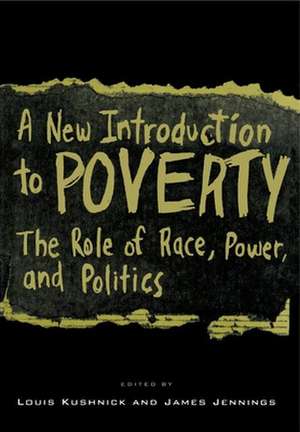A New Introduction to Poverty – The Role of Race, Power, and Politics
Autor Louis Kushnick, James Jenningsen Limba Engleză Paperback – 31 dec 1998
| Toate formatele și edițiile | Preț | Express |
|---|---|---|
| Paperback (1) | 250.50 lei 6-8 săpt. | |
| MI – New York University – 31 dec 1998 | 250.50 lei 6-8 săpt. | |
| Hardback (1) | 530.74 lei 6-8 săpt. | |
| Wiley – 31 dec 1998 | 530.74 lei 6-8 săpt. |
Preț: 250.50 lei
Nou
Puncte Express: 376
Preț estimativ în valută:
47.93€ • 50.15$ • 39.82£
47.93€ • 50.15$ • 39.82£
Carte tipărită la comandă
Livrare economică 03-17 aprilie
Preluare comenzi: 021 569.72.76
Specificații
ISBN-13: 9780814742396
ISBN-10: 0814742394
Pagini: 400
Dimensiuni: 178 x 254 x 15 mm
Greutate: 0.62 kg
Ediția:New.
Editura: MI – New York University
ISBN-10: 0814742394
Pagini: 400
Dimensiuni: 178 x 254 x 15 mm
Greutate: 0.62 kg
Ediția:New.
Editura: MI – New York University
Recenzii
"This collection of 17 essays examines poverty and its causes from a variety of angles. The common thread is a concern for the structural causes of poverty; the book therefore offers a welcome alternative to the dominant ideological views that portray poverty as a result of individuals' decisions, attributes and/or moral failings...The authors show the connections between capitalism, slavery and the development of state policies and ideologies that maintained the oppressed and exploited status of African Americans after the Civil War and constituted the basis for the emergence of white identity and privilege to the detriment of working class identities based on a recognition of the common plight of workers, regardless of skin color...this is an outstanding collection, useful for courses in social stratification, the sociology of work, and race and ethnic relations."
--Science and Society
"This collection of 17 essays examines poverty and its causes from a variety of angles. The common thread is a concern for the structural causes of poverty; the book therefore offers a welcome alternative to the dominant ideological views that portray poverty as a result of individuals' decisions, attributes and/or moral failings...The authors show the connections between capitalism, slavery and the development of state policies and ideologies that maintained the oppressed and exploited status of African Americans after the Civil War and constituted the basis for the emergence of white identity and privilege to the detriment of working class identities based on a recognition of the common plight of workers, regardless of skin color...this is an outstanding collection, useful for courses in social stratification, the sociology of work, and race and ethnic relations." --Science and Society
--Science and Society
"This collection of 17 essays examines poverty and its causes from a variety of angles. The common thread is a concern for the structural causes of poverty; the book therefore offers a welcome alternative to the dominant ideological views that portray poverty as a result of individuals' decisions, attributes and/or moral failings...The authors show the connections between capitalism, slavery and the development of state policies and ideologies that maintained the oppressed and exploited status of African Americans after the Civil War and constituted the basis for the emergence of white identity and privilege to the detriment of working class identities based on a recognition of the common plight of workers, regardless of skin color...this is an outstanding collection, useful for courses in social stratification, the sociology of work, and race and ethnic relations." --Science and Society
Notă biografică
Louis Kushnick is Director of the Centre for the Study of Globalisation, Eurocentrism, and Marginality in the Department of Sociology in Manchester, where he is a Senior Lecturer. Author of "Race, Class, and Struggle: Essays on Racism and Inequality in Britain and the United States and Western Europe," he is currently Vice Chair of the Institute of Race Relations and has been the editor of Sage Race Relations Abstracts since 1980.

























